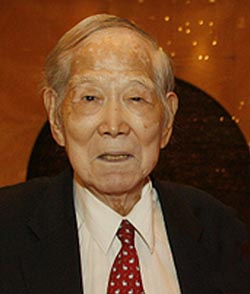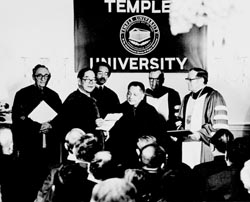|
Born in China, Niu earned a bachelor's degree in biology from Beijing University in 1936. After graduating, he worked for seven years as a lecturer at National Southwestern Associated University, an institution created in Kunming during the Second Sino-Japanese War.
In 1944, he and his wife, Lillian Paoying Niu, moved to the United States and studied biology at Stanford University, where he earned a Ph.D. in 1946 and she earned an M.S. in 1947. The Nius then moved to New York, where he took a job at the Rockefeller Institute for Medical Research (now Rockefeller University).
Niu joined the faculty of Temple’s Biology Department in 1960 as an associate professor. After receiving tenure in 1962, he served as a professor until his retirement at the end of 1981.
With the help of a grant from the Rockefeller Foundation, Niu helped found the Chinese Academy of Sciences' Institute of Developmental Biology in Beijing in 1980, where he directed a laboratory until his death. The creation of the institute is acknowledged to be among the first attempts to help Chinese researchers to rejoin the international scientific community after the Cultural Revolution in the 1960s and '70s.
Niu was appointed honorary professor or advisor to more than 80 institutes and organizations in China. He was a two-time recipient of a Guggenheim Fellowship, and was elected an academician by Academia Sinica, Taiwan's Academy of Science.
An American citizen, Niu spent part of the year in Elkins Park, Pa., and part in Beijing. Niu and his wife were generous contributors to Temple; their donations included gifts to support research in the Biology Department in the College of Science and Technology.
In addition to his wife, Niu is survived by two daughters, both of whom are Temple alumnae: McYing Niu, a resident of Montgomery County, Pa., earned a bachelor's degree in English in 1969 and Manette T. Niu, a physician in Maryland, earned a bachelor's degree in anthropology in 1973.
|

